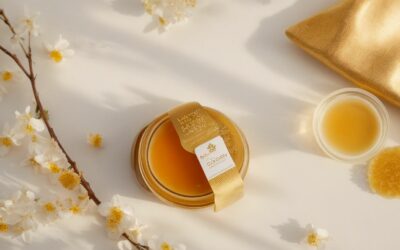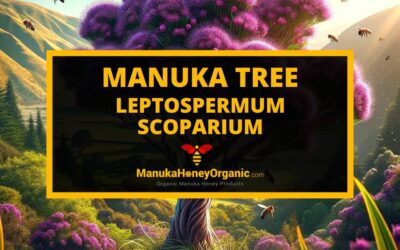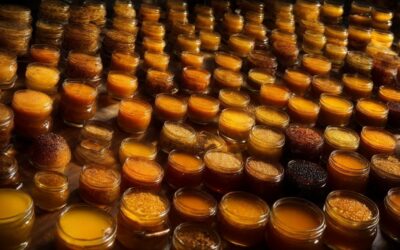Are you looking for a healthier alternative to traditional honey? Look no further, because organic honey has been gaining popularity for its natural benefits and sustainable production methods.
In this article, we’ll delve into the world of organic honey and why it’s important for your well-being.
What Is Organic Honey?
Organic honey is a type of honey that is produced using organic methods and practices. This means that the bees are not exposed to synthetic pesticides or antibiotics, and the honey is free from chemical residues.
Organic honey is sourced from beehives located in areas with a diverse and abundant floral environment, allowing the bees to collect nectar from a variety of organic flowers.
The end result is a delicious and pure honey that maintains the natural goodness of the nectar it is made from.
Pro-tip: When looking for organic honey, make sure to choose one that is certified by a reputable organization to ensure its authenticity.
How Is Organic Honey Different From Regular Honey?
There are several notable differences between organic honey and regular honey, including the source of nectar, beekeeping practices, and certification requirements. These differences should be taken into consideration when choosing between the two options.
- Source of Nectar: Organic honey is produced from nectar collected by bees from flowers that have not been treated with synthetic pesticides or herbicides.
- Beekeeping Practices: Organic beekeepers adhere to strict guidelines, including providing bees with organic feed and avoiding the use of antibiotics or chemicals in hive management.
- Certification Requirements: In order to be labeled as organic, honey must meet specific standards set by organic certification bodies. This ensures transparency and accountability in the production process.
The practice of producing organic honey dates back centuries, when beekeepers recognized the importance of preserving the purity of honey by avoiding the use of chemicals.
This practice has gained popularity in recent years due to the increasing demand for natural and sustainable products. Today, organic honey continues to be highly valued for its environmental benefits and high-quality standards.
What Are The Standards For Organic Honey?
What Are The Standards For Organic Honey?
Organic honey must adhere to specific standards in order to be labeled as such. These standards may vary depending on the country or certification body. However, they typically include the following requirements:
- Bees must forage on organic flowers, meaning the plants they collect nectar from are grown without the use of synthetic pesticides or fertilizers.
- No chemicals, including antibiotics or synthetic treatments for pests or diseases, can be used during the beekeeping process.
- The honey must be processed and packaged separately from non-organic honey to prevent any contamination.
- Organic certification labels, such as USDA Organic or EU Organic, provide assurance that these standards have been met.
Fun Fact: In addition to being a healthier option for consumers, organic honey also supports biodiversity by promoting a healthier ecosystem for bees and other pollinators through organic farming practices.
What Are The Benefits Of Organic Honey?
You may have heard of organic honey, but what exactly makes it different from regular honey? In this section, we will discuss the various benefits of choosing organic honey over conventional honey.
From its nutrient-rich composition to its lack of harmful chemicals, organic honey offers a number of advantages for both consumers and the environment. Let’s dive into the specifics and discover why organic honey is a wise choice.
1. Contains More Nutrients
Organic honey is known to contain more nutrients compared to regular honey, making it a healthier choice. Here are some steps to consider:
- Look for dark-colored honey, as it tends to have a higher nutrient content.
- Choose raw, unfiltered honey, as the processing of regular honey may remove some nutrients.
- Consider honey from specific sources, such as UMF Manuka honey, which is renowned for its high concentration of antioxidants and antibacterial properties.
- Check for organic certification labels to ensure that the honey is produced without the use of synthetic chemicals.
- Support local beekeepers who follow organic practices, as their honey is likely to contain more nutrients.
2. Free From Harmful Chemicals
Organic honey is a healthier alternative to regular honey as it is free from harmful chemicals. To ensure that you are purchasing honey that is safe and chemical-free, follow these steps:
- Look for Organic Certification Labels: Check for labels such as USDA Organic or EU Organic, which guarantee that the honey has been produced without the use of synthetic chemicals.
- Buy from Reputable Sources: Purchase honey from trusted brands or local beekeepers who follow organic practices.
- Check the Ingredients List: Ensure that the honey is labeled as “100% organic” or “organic,” indicating that no harmful chemicals have been used in the production process.
By following these steps, you can enjoy the benefits of organic honey without worrying about harmful chemicals.
3. Supports Sustainable Farming Practices
Supporting sustainable farming practices is a key benefit of choosing organic honey. Here are some steps to explain how organic honey production promotes sustainability:
- Organic beekeepers use natural methods like crop rotation and maintaining biodiversity to support healthy ecosystems.
- They avoid using synthetic pesticides and antibiotics, protecting bees and other pollinators from harm.
- Organic honey production supports sustainable farming practices by contributing to soil health through avoiding the use of synthetic fertilizers that can degrade soil quality.
- Beekeepers prioritize the preservation of natural habitats and avoid practices that harm local wildlife.
By supporting organic honey, consumers contribute to sustainable agriculture and the protection of our environment.
How Is Organic Honey Produced?
Organic honey is a popular and highly sought-after product due to its purity and health benefits. But how exactly is this golden liquid produced? In this section, we will delve into the process of organic honey production.
We will discuss how bees forage on organic flowers, and how this impacts the quality of the honey. Additionally, we will explore how no chemicals are used in the beekeeping process, ensuring that the honey remains completely natural and organic.
1. Bees Forage on Organic Flowers
Bees gather nectar and pollen from organic flowers to produce organic honey. This process involves the following steps:
- Bees gather nectar and pollen from flowers that have not been treated with synthetic pesticides or fertilizers.
- The bees then transport the collected nectar and pollen back to their beehive.
- Inside the beehive, the bees process the nectar into honey by adding enzymes and reducing its water content.
- The honey is stored in honeycomb cells, where it ripens and matures.
- Once the honey is ready, the bees seal the honeycomb cells with beeswax.
- Beekeepers carefully harvest the organic honey from the honeycomb cells without using chemicals or additives.
2. No Chemicals Are Used in Beekeeping Process
No chemicals are used in the beekeeping process of producing organic honey. This ensures the purity and naturalness of the honey. Here are the steps involved in chemical-free beekeeping:
- Use natural hive materials: Use wooden hives and frames made from untreated wood instead of plastic or chemically treated materials.
- Organic beekeeping practices: Follow organic methods for hive management, such as using natural pest control methods like essential oils and traps instead of chemical pesticides. This ensures that no chemicals are used in the beekeeping process.
- Provide natural food sources: Allow bees to forage on organic flowers and provide them with access to pesticide-free nectar and pollen sources.
- Avoid synthetic treatments: Refrain from using synthetic medications or antibiotics to treat bee diseases and pests. Instead, rely on natural remedies.
What Are The Potential Risks Of Organic Honey?
While organic honey is often touted for its health benefits and environmental sustainability, it is important to also consider the potential risks associated with this type of honey. In this section, we will discuss two potential risks of organic honey: possible contamination from non-organic sources and the higher cost compared to conventional honey. By understanding these risks, consumers can make informed decisions about whether organic honey is the best choice for them.
1. Possible Contamination From Non-Organic Sources
Possible contamination from non-organic sources is a valid concern when purchasing organic honey. To ensure that you are getting truly organic honey, follow these steps:
- Look for the organic certification labels on the packaging.
- Purchase from reputable sources that prioritize organic standards.
- Verify that the honey is organic by checking the ingredients list.
Pro-tip: For added caution, consider buying honey directly from local beekeepers or farmers markets. This way, you can inquire about their beekeeping methods and the sourcing of their honey.
2. Higher Cost
The higher cost is an important consideration when purchasing organic honey. To help you navigate this aspect, here are some steps to follow:
- Compare prices: Research different brands and compare their prices to find the most affordable option.
- Purchase in bulk: Buying larger quantities can often result in lower unit costs, making it more budget-friendly.
- Consider local options: Look for local beekeepers or farmers markets that may offer organic honey at a lower cost due to reduced transportation expenses.
- Explore online options: Online retailers may offer competitive prices and discounts, allowing you to find organic honey at a more reasonable cost.
- Look for sales or promotions: Keep an eye out for special offers or discounts that can help you save money on organic honey.
How To Identify And Buy Organic Honey?
When it comes to purchasing honey, it’s important to know what you’re buying. Organic honey is becoming increasingly popular, but how do you know if the honey you’re purchasing is truly organic?
In this section, we’ll discuss how to identify and buy organic honey. We’ll cover the importance of looking for organic certification labels, buying from reputable sources, and checking the ingredients list.
By the end, you’ll have the knowledge to confidently purchase authentic organic honey.
1. Look for Organic Certification Labels
When purchasing organic honey, it is crucial to search for organic certification labels to ensure its authenticity and quality. Follow these steps:
- Check the packaging: Look for the “Certified Organic” label displayed prominently on the honey jar or bottle.
- Verify the certification: Research the certifying body to ensure it is reputable and recognized.
- Read the fine print: Look for specific information on the label, such as the percentage of organic ingredients or any additional certifications.
- Buy from trusted sources: Purchase organic honey from reliable brands or reputable local producers.
- Support local beekeepers: Consider buying honey directly from local beekeepers who follow organic practices.
- Ask questions: Don’t hesitate to inquire about the honey’s production methods or any other concerns you may have.
True story: My friend always makes sure to look for organic certification labels when buying honey. One time, she discovered a local beekeeper who produced organic honey using sustainable practices.
Not only did the honey taste delicious, but she also felt good knowing that she was supporting a small business and promoting environmentally friendly beekeeping.
2. Buy from Reputable Sources
When purchasing organic honey, it is crucial to select trustworthy sources to guarantee authenticity and high quality.
- Research: Seek out organic honey producers or suppliers with a reliable reputation and positive feedback from customers.
- Certifications: Verify the presence of recognized organic certifications, such as USDA Organic or EU Organic, on the product labels or websites.
- Local sources: Consider buying from local beekeepers or at farmers’ markets where you can directly communicate with the producers and inquire about their organic practices.
- Transparent information: Reputable sources provide clear information about their honey production process, including beekeeping methods, foraging practices, and any additional certifications they may hold.
- Third-party verification: Look for honey that has been verified by independent organizations or audited by third-party entities to ensure compliance with organic standards.
3. Check the Ingredients List
When buying organic honey, it is important to carefully examine the ingredients list to ensure its authenticity. Here are the steps to follow:
- Confirm its certification by looking for the word “Organic” on the label.
- Check the list of ingredients for any additives or non-organic substances.
- Make sure that the only ingredient listed is “Organic Honey.”
Fact: Did you know that organic honey is produced by bees that collect nectar from organic flowers, resulting in a healthier and more sustainable product?
Frequently Asked Questions
What is Organic Honey?
Organic honey is a type of honey that is produced without the use of any chemicals, additives, or pesticides. It is collected from beehives that are located in areas free from any contamination and are managed using only natural methods.
Is Organic Honey different from regular honey?
Yes, organic honey is different from regular honey. Regular honey may be processed using various chemicals and additives, while organic honey is produced using strictly natural methods and is free from any synthetic substances.
How is Organic Honey produced?
Organic honey is produced by beekeepers who follow specific guidelines and regulations set by certifying bodies. The bees collect nectar from flowers that are free from any pesticides, and the honey is extracted and processed without the use of any chemicals.
What are the benefits of consuming Organic Honey?
Organic honey offers numerous health benefits, including antioxidant properties, antibacterial and anti-inflammatory effects, and potential allergy relief. It also contains natural enzymes, vitamins, and minerals, making it a nutritious and wholesome food.
Is Organic Honey safe for everyone to consume?
Yes, organic honey is generally safe for everyone to consume. However, it is not recommended for infants under one year old due to the risk of bacterial contamination. People with allergies to bee products should also consult their doctor before consuming organic honey.
How can I identify if honey is truly organic?
To ensure that you are purchasing genuine organic honey, look for labels or certifications from reputable certifying bodies, such as USDA, EU Organic, or Canadian Organic. These labels indicate that the honey has been produced and processed according to organic standards.
I’m a Manuka honey enthusiast and creator of Manuka Honey Organic, a blog where I share my journey with authentic Manuka honey from New Zealand. I want everyone to learn about the healing powers of Manuka honey.





